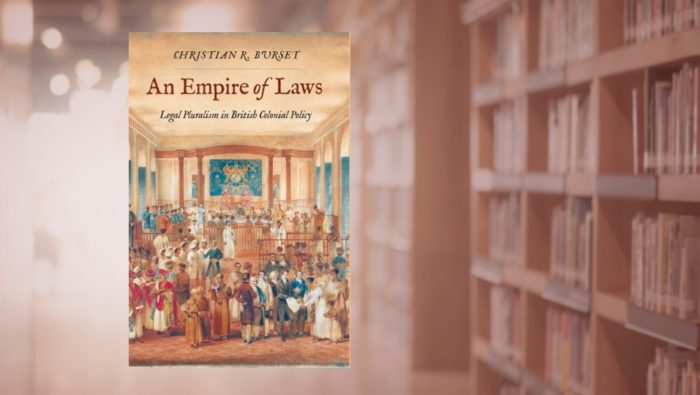
Legal Pluralism and the Making of the Second British Empire

Christian R. Burset’s An Empire of Laws: Legal Pluralism in British Colonial Policy offers a refreshing perspective on the study of legal pluralism by bringing intent, consciousness, and choice back to history writing. His chief claim is that legal pluralism was neither a natural nor a historical development based on past practices (precedent) but a result of deliberate policy decisions by colonial officials. Colonial politics was to define what parts of the empire received legal pluralism.
Burset advances the idea of “strategic legal pluralism,” which he defines as “a polity’s deliberate application of different legal systems to different groups of people” (p.7). In order for legal pluralism to be strategic, he identifies two conditions: it has to be “manifest” – it cannot be subtle or latent – and it should reflect “an official decision” – the role of political elites or those in power as opposed to common people. The book is a tight-knit study of vexing policy decisions about what laws to apply to newly acquired territories of the empire in the wake of the Seven Years’ War, which ended in 1763. Though the temporal span of the book is quite short (the last quarter of the 18th Century), spatially it takes “the British empire as the unit of analysis” (p.5), with case studies based on Canada (Quebec) and India (Bengal).
The book identifies the ideological origins of strategic legal pluralism in the debates between populists and paternalists. While populists conceived of the empire as closely tied to England and advocated for the application of English laws in the colonies, paternalists considered the empire as an extractive and exploitative enterprise, albeit rooted in cultural tolerance for indigenous laws.. Burset’s study of Quebec and Illinois (Ch. 3) shows that even when geographical and racial considerations were in favor of the introduction of English laws, colonial officials demurred on it, not wanting to make either of those places attractive for British settlers and investors. Colonial officials considered the “commercial culture” (p.47) of Canada to be different from that of England, so much so that English laws (like Bankruptcy laws) were deemed not suitable for Canadians. As for Bengal, a mix of English and Mughal/indigenous laws co-existed after much wrangling between those who wanted the East India Company to be a political power (Robert Clive) and those who wanted it to remain mainly a commercial power (Warren Hastings). The making of Bengal as a tributary province caused some rapprochement between these views. Ultimately, the key question in Bengal came down to who would enjoy the spoils of Bengal and not the propriety of the spoils (p. 140).
Burset’s claim that “British law in India was more rigidly plural than the Mughal system it replaced” (p. 128) is significant. The basis for this claim is that in Mughal India, Hindu, and Muslim laws were not discrete realms but part of a single legal system. In my view, this raises an interesting question about what makes laws plural in a state or empire with the unitary conception of sovereignty. The British were far more centralised and extractive than the Mughals, for the British were more adept in deploying state capacity for revenue extraction. Legal pluralism in British India, then, raises an interesting question: If sovereignty in British India was constitutionally vested in the Crown-in-Parliament, what does legal pluralism actually pluralise? Engaging with this question could help us the see the limits of legal pluralism in authoritarian or colonial societies. Furthermore, as Saksena shows in her recent book, the British courts liberally applied principles of international law in adjudicating colonial disputes, and one wonders whether international law could be added to the matrix of legal pluralism. In other words, should one think about legal pluralism as not just the co-existence of British and indigenous laws, but also seemingly supra national laws of the nations?
As the above discussion shows, Burset’s book is thought-provoking and refreshing. It shows, in a methodical fashion, how legal pluralism was a deliberate choice on the part of British officials and not a natural process of laws following sovereignty. In so doing, Burset reinstitutes agency to imperial actors and makes colonialism a choice, not a metaphysical act of morality or political accident. In embedding intent and choice back in imperial policies and legal debates, Burset advances a new conception of legal pluralism that bridges it with the history of mentalité.

